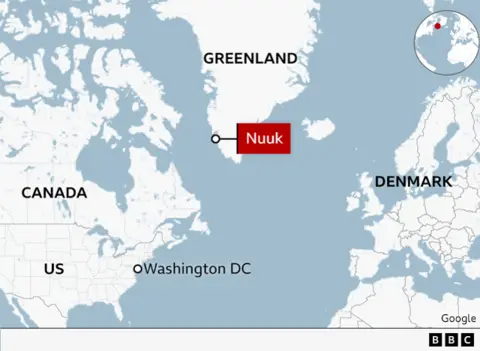Denmark is fighting to stay calm in the crisis over Trump’s threat to take over Greenland

 Getty Images
Getty ImagesCopenhagen’s bleak January weather echoes the mood of Denmark’s politicians and business leaders.
“We take this situation very seriously,” Foreign Minister Lars Løkke Rasmussen said of Donald Trump’s threats to annex Greenland – and punish Denmark with high prices if it stands in the way.
But, he added, the government “has no desire to fuel a war of words.”
Prime Minister Mette Frederiksen downplayed Trump’s suggestion that the US might use the military to seize Greenland. “I have no idea that it will ever come to that,” he told Danish TV.
And Lars Sandahl Sorensen, CEO of Danish Industry, also said there is “every reason to be calm… nobody is interested in a trade war.”
But behind the scenes, hastily arranged high-level meetings have been going on all week in Copenhagen, reflecting the shock caused by Trump’s comments.
Greenland Prime Minister Mute Egede boarded a plane to meet the prime minister and King Frederik X on Wednesday.
And on Thursday night, party leaders from across the political spectrum met in an unusual meeting on the issue with Mette Frederiksen in the Danish parliament.
Faced with what many in Denmark called Trump’s “anger”, Frederiksen widely tried to strike a conciliatory tone, once again calling the US “Denmark’s closest partner”.
 AFP
AFPIt was “natural” for the US to be concerned about the Arctic and Greenland, he added.
However, he also said that any decision on the future of Greenland should be up to its people alone: ”Greenland belongs to the Greenlanders… and it is the Greenlanders themselves who must define their future.”
His method of caution is twofold.
On the other hand, Frederiksen is determined to avoid escalating the situation. He came under fire, in 2019, when Trump canceled a trip to Denmark after his proposal to buy Greenland was “absurd”.
“At that point he had only been in office for a year, things went back to normal,” political journalist Erik Holstein told the BBC. “But maybe this is the new normal.”
But Frederiksen’s comments also speak to Denmark’s decision not to interfere in the internal affairs of Greenland – an autonomous region with its own parliament and whose people have always relied heavily on independence.
“He should have been more clear in rejecting this idea,” said opposition MP Rasmus Jarlov.
“This level of disrespect for the incoming US president against the most loyal allies and friends is unprecedented,” he told the BBC, although he admitted that Trump’s toughness “surprised everyone.”
The conservative MP believes that Frederiksen’s insistence that “only Greenland… can decide and define Greenland’s future” has put too much pressure on the island’s residents. “It would be wise and prudent to stand behind Greenland and say clearly that Denmark does not want it. [a US takeover].”
 AFP
AFPThe Greenland question is a sensitive one in Denmark, whose prime minister recently formally apologized for leading a 1950s social experiment that saw Inuit children removed from their families to be re-educated as “model Danes”.
Last week, Greenland’s leader said the region must free itself from “the shackles of colonialism.”
In doing so he tapped into the rise of nationalist sentiment, fueled by the interest of the younger generations of Greenlanders in the traditional culture and history of the Inuit.
Most analysts now expect a successful independence referendum in the near future. While to many it may be seen as a victory, it may also introduce a new set of problems, as 60% of Greenland’s economy is dependent on Denmark.
Independent Greenland “will have to make decisions,” Karsten Honge said. The Social Democrat MP now fears his preferred option for a new Commonwealth-style deal “based on equality and democracy” is unlikely to happen.

Sitting in his parliamentary office decorated with poems and paintings depicting scenes from Inuit life, Honge said Greenland would need to decide “how much it values independence”. It could cut ties with Denmark and turn to the US, Honge said, “but if you value independence that doesn’t make sense.”
Opposition MP Jarlov says that although there is no reason to force Greenland to become part of Denmark, “it is very close to being an independent country already”.
Its capital Nuuk is self-governing, but relies on Copenhagen for currency control, foreign relations and defense – and much of its funding.
“Greenland today has more freedom than Denmark from the EU,” Jarlov said. “So I hope they will think things through.”
With Mette Frederiksen having the difficult task of responding firmly while not offending Greenland or the US, the strongest opposition to Trump’s comments so far has come from outside Denmark.
The principle of non-violation of borders “applies to all countries… whether they are very small or very strong,” German Chancellor Olaf Scholz warned, while French Foreign Minister Jean-Noël Barrot said the EU would not allow it. other nations “invade its sovereign borders”.
Their comments have given rise to deep concerns within the EU about how he will handle a Trump presidency. “This is not just bad for Greenland and Denmark – it’s serious for the whole world and Europe as a whole,” said MP Karsten Honge.
“Imagine a world – which we may face in just a few weeks – where international agreements do not exist. That would shake everything up, and Denmark would be only a small part of it.”
Denmark’s business sector is also deeply nervous after Trump said he would “tariff Denmark at a very high rate” if it refused to cede Greenland to the US.
A 2024 Danish Industry study showed that Denmark’s GDP would drop by three percentage points if the US imposed 10% tariffs on imports from the EU to the US as part of a global trade war.
Isolating Danish products from EU imports is almost impossible in the US, and will likely lead to retaliatory measures from the EU. But business industry experts are taking few chances, and in Denmark as elsewhere on the continent, huge resources are being spent internally to plan the possible outcomes of Donald Trump’s second term in the White House.
As his coronation approaches, the Danes prepare as much as possible to withstand the storm. There is guarded hope that the president-elect can quickly shift focus to grievances against other EU partners, and that the Greenland question can be put aside for a while.
But the confusion brought about by Trump’s refusal to rule out military intervention to seize Greenland.
Karsten Honge said that Denmark will face any decision taken by the US.
“They just need to send a small warship to go off the coast of Greenland and send a polite letter to Denmark,” he said, partly in jest.
“The last sentence will be: well, Denmark, what are you going to do about it?
“That’s the new truth about Trump.”
Source link



